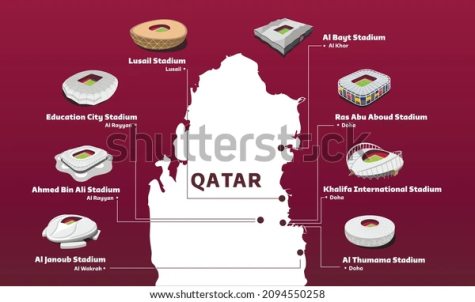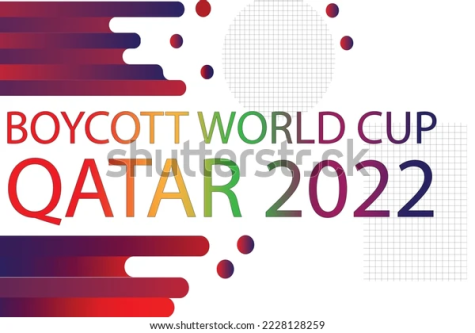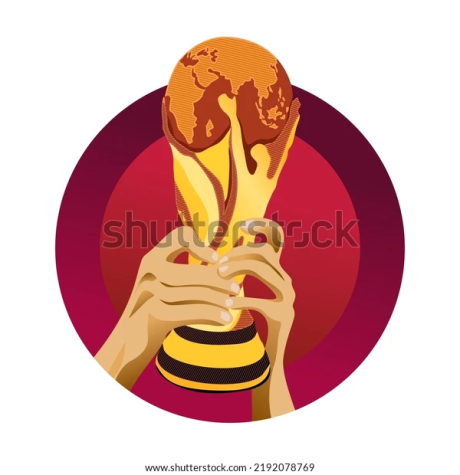Controversy overshadows 2022 FIFA World Cup
The 2022 FIFA World Cup logo is a traditional Arabic shawl and resembles the number eight to symbolize the eight stadiums in Qatar. Unlock, a studio based in Lisbon, Portugal, designed the logo. Photo courtesy of Shutterstock
December 7, 2022
The 2022 FIFA World Cup kicked off with an opening ceremony on Nov. 20 at the Al Bayt Stadium in Al Khor, Qatar.
At the ceremony, actor Morgan Freeman and Qatari YouTuber Ghanim Al-Muftah were on stage to initiate the tournament.
Jungkook, a South Korean singer and member of BTS, sang “Dreamers” with Qatari singer Fahad Al-Kubaisi.
As the opening ceremony came to a close, players for Qatar and Ecuador made their way onto the pitch to start the tournament’s first match.
While billions of people watch the month-long festivities from around the world, some concerns remain unaddressed: this year’s World Cup is tainted by Qatar’s violations of human rights.
Building stadiums

On December 2, 2010, FIFA announced that Qatar would host the 2022 World Cup.
Since the announcement, Qatar has built eight stadiums to hold 64 matches.
However, the stadiums were built by migrant workers who were underpaid, mistreated, and exploited.
Qatar used a system known as “kafala,” meaning that migrant workers could not return to their home country without permission from their employer.
According to a report from Real Sports with Bryant Gumbel, migrant workers had 12-hour work days in temperatures of up to 120 degrees during the summer.
Poor living conditions
Qatar provided homes for the workers, but the conditions were unsafe and unsanitary.
Eight men shared a single room with bed bug-infested mattresses.
Additionally, the men bathed using toilet water because there were no showers for them to use.
With limited resources and little to no pay, 600 men had to share two bug-infested kitchens.
Some migrant workers protested for more pay and better working conditions, resulting in their arrest.
According to a report published by The Guardian in Feb. 2021, more than 6,500 migrant workers have died working on facilities for the World Cup.
Qatar disputes this number and claims that only three people died on World Cup construction sites.
Due to the backlash, Qatar and the International Labour Organization (ILO) created additional measures in 2021 to safeguard the health of migrant workers.
The reforms included reducing the number of work hours during the summer and implementing a nondiscriminatory minimum wage of 1,000 Qatari riyals ($274.65) a month.
Although this was a step in the right direction, the damage has already been done.
Nations protesting in Qatar

In addition to the issues regarding the rights of migrant workers, Qatar’s anti-LGBTQ+ laws spark more reasons for protest.
Homosexuality is illegal in Qatar and is punishable by a fine, up to seven years in prison, or even a death sentence.
Among other controversies involving women’s rights and the climate crisis, many teams have attempted to promote equality at the World Cup.
The team captains of Belgium, Denmark, England, Germany, the Netherlands, and Wales planned to wear a rainbow-colored OneLove anti-discrimination armband.
However, FIFA asserted that they would impose sanctions on the teams, and the captains would receive a yellow card as soon as the match started.
Since receiving two yellow cards in one match disqualifies a player, the risk was not worth it.
Belgium:
Belgium’s request to wear away jerseys with the word “love” written on the inside of the collar was denied by FIFA.
FIFA said it was because the jerseys have a commercial link to a rave festival, Tomorrowland.
The Belgian team has previously said that the jerseys were a “symbol for mutual values on diversity, equality, and inclusivity,” which could have played a role in FIFA’s decision.
England:
England’s team took a knee before kickoff in their match against Iran to protest against discrimination and inequality.
Germany:
Before Germany’s match against Japan, all of the starting players for Germany covered their mouths for the team photo, symbolizing that they were denied a voice with the armband decision.
United States:
Inside the training facility for the United States, all of their logos have been changed from red, white, and blue to a rainbow theme, promoting inclusivity.
Additionally, eight members of the U.S. team played a pick-up game with 20 migrant workers who contributed to the construction of stadiums in Qatar.
Iran:
Amid the human rights protests in their home country sparked by the death of 22-year-old Mahsa Amini, Iran’s team refused to sing their national anthem before their match against England.
There is no larger stage to make a statement beside the World Cup, and it is unclear what repercussions FIFA will take against the teams either during or after the tournament.
Back to soccer
The 32 teams in the 2022 World Cup were divided into eight groups, consisting of four teams each.
Here are the groups (courtesy of Sky Sports):
Group A: Qatar, Ecuador, Senegal, Netherlands
Group B: England, Iran, USA, Wales
Group C: Argentina, Saudi Arabia, Mexico, Poland
Group D: France, Australia, Denmark, Tunisia
Group E: Spain, Costa Rica, Germany, Japan
Group F: Belgium, Canada, Morocco, Croatia
Group G: Brazil, Serbia, Switzerland, Cameroon
Group H: Portugal, Ghana, Uruguay, South Korea
Predictions at Loretto Academy

At Loretto Academy, many teams appear to be among the favorites to win the World Cup this year.
Freshman:
Loretto freshman Marcela Lievano said, “I’m hoping Mexico, but who will most likely win is Spain because they play good, and how they played against Costa Rica by the score being 7-0.”
Spain won the World Cup in 2010, defeating the Netherlands 1-0, while Mexico has never won.
Sophomore:
Loretto sophomore Hailey Garcia said, “I think Brazil is going to win simply because they have a solid team and strong players like Vinicius Junior and Neymar da Silva Santos Júnior, and Brazil’s team is most widely expected to win the tournament.
Also, I think France is looking pretty good, and they also won the last World Cup in 2018.”
Brazil has five World Cup wins, the most out of all nations, and France has won twice.
Neymar is 30 years old and is entering his last World Cup, still looking to win for the first time.
Junior:
Loretto junior Daniela Rodriguez said, “I have faith in my country, Mexico, but the chances are very low considering the selection of the team and recent games.
However, Portugal and Brazil might take this World Cup because they are two of the greatest teams right now.”
Portuguese forward Cristiano Ronaldo is 37 years old and is also entering his final World Cup.
Portugal has never won before.
Senior:
Loretto senior Gianna Guerrero said, “As much as I would love for the country I come from to win, Mexico, it won’t happen because our players aren’t trained or ready enough.
I hope it’s Brazil because they are truly so good at football…Argentina is a good candidate too, but they rely too much on Messi.”
Lionel Messi is 35 years old and is also playing in his final World Cup.
Although Messi was not on the team yet, Argentina has won the tournament twice.
World Cup explained
The first stage of the tournament is the group stage, where the two teams with the most points in each group will advance to the round of 16.
Here are the scores for the group stage (courtesy of Sky Sports):
November 20
Group A: Qatar 0-2 Ecuador
November 21
Group B: England 6-2 Iran
Group A: Senegal 0-2 Netherlands
Group B: USA 1-1 Wales
November 22
Group C: Argentina 1-2 Saudi Arabia
Group D: Denmark 0-0 Tunisia
Group C: Mexico 0-0 Poland
Group D: France 4-1 Australia
November 23
Group F: Morocco 0-0 Croatia
Group E: Germany 1-2 Japan
Group E: Spain 7-0 Costa Rica
Group F: Belgium 1-0 Canada
November 24
Group G: Switzerland 1-0 Cameroon
Group H: Uruguay 0-0 South Korea
Group H: Portugal 3-2 Ghana
Group G: Brazil 2-0 Serbia
November 25
Group B: Wales 0-2 Iran
Group A: Qatar 1-3 Senegal
Group A: Netherlands 1-1 Ecuador
Group B: England 0-0 USA
November 26
Group D: Tunisia 0-1 Australia
Group C: Poland 2-0 Saudi Arabia
Group D: France 2-1 Denmark
Group C: Argentina 2-0 Mexico
November 27
Group E: Japan 0-1 Costa Rica
Group F: Belgium 0-2 Morocco
Group F: Croatia 4-1 Canada
Group E: Spain 1-1 Germany
November 28
Group G: Cameroon 3-3 Serbia
Group H: South Korea 2-3 Ghana
Group G: Brazil 1-0 Switzerland
Group H: Portugal 2-0 Uruguay
November 29
Group A: Netherlands 2-0 Qatar
Group A: Ecuador 1-2 Senegal
Group B: Wales 0-3 England
Group B: Iran 0-1 USA
November 30
Group D: Australia 1-0 Denmark
Group D: Tunisia 1-0 France
Group C: Poland 0-2 Argentina
Group C: Saudi Arabia 1-2 Mexico
December 1
Group F: Croatia 0-0 Belgium
Group F: Canada 1-2 Morocco
Group E: Costa Rica 2-4 Germany
Group E: Japan 2-1 Spain
December 2
Group H: South Korea 2-1 Portugal
Group H: Ghana 0-2 Uruguay
Group G: Serbia 2-3 Switzerland
Group G: Cameroon 1-0 Brazil
In the round of 16, the winner of each group plays a match against the runner-up of another group.
The following nations advanced to the round of 16: Argentina, Australia, Brazil, Croatia, England, France, Japan, Morocco, Netherlands, Poland, Portugal, Senegal, South Korea, Spain, Switzerland, USA.
Unlike the matches in the group stage, the matches in the round of 16 cannot end in a draw, meaning that the matches will go into 30 minutes of extra time and penalty kicks if necessary.
Here are the scores for the round of 16 (courtesy of Sky Sports):
December 3
Netherlands 3-1 USA
Argentina 2-1 Australia
December 4
France 3-1 Poland
England 3-0 Senegal
December 5
Japan 1-1 Croatia – Croatia win 3-1 on penalties
Brazil 4-1 South Korea
December 6
Morocco 0-0 Spain – Morocco win 3-0 on penalties
Portugal 6-1 Switzerland
After the round of 16, only eight teams will advance to play in the quarter-finals.
The following nations advanced to the quarter-finals: Argentina, Brazil, Croatia, England, France, Morocco, the Netherlands, and Portugal.
The four winning teams from the quarter-finals will advance to the semi-finals.
The two losers from the semi-finals will face off in a third-place play-off match on Dec. 17.
The two winners from the semi-finals will face off in the final on Dec. 18.
Future of the World Cup
The next World Cup will take place during the summer of 2026 in Canada, the U.S., and Mexico.
As FIFA continues to plan for future tournaments, they must consider the ethical, social, and environmental ramifications of their decision in selecting a host country.
Information courtesy of ESPN, Human Dignity Trust, ILO, Real Sports with Bryant Gumbel, Sky Sports, and The Guardian





